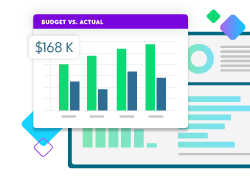What is Fund Accounting?
Fund accounting is a specialized accounting method that focuses on the allocation, management, and reporting of funds that carry a donor or other funder restriction. The nonprofit is obligated to use these funds as directed by the donor, foundation or government agency. Government funding can also be contractual. The nonprofit is under contract to spend to deliver services as a proxy of that government agency. Each of these funding sources carries restrictions around how the nonprofit can use the money and how much can be spent on delivering individual services.
Specialized tracking and reporting help ensure transparency and accountability that the contributed or contractual assets are being used for their intended purpose. In this guide, you will learn what types of organizations need fund accounting, the different funds an organization might have, and best practices for implementing fund accounting for your organization.
Table of Contents
- What Types of Organizations Need Fund Accounting?
- What Types of Funds Need Accounting?
- Fund Accounting Best Practices
- Fund Accounting vs. Traditional Accounting
- Summary FAQs
What Types of Organizations Need Fund Accounting?
Nonprofit Organizations
Nonprofit organizations, including healthcare institutions and foundations, all have multiple sources of funding.
Each fund must be managed separately to ensure the funds are being used for the purpose intended. Each fund, grant, or contract carries its own unique set of restrictions. Each must be accounted for separately and not comingled. These assets are not fungible in the same way revenue is in a commercial enterprise.
The fund accounting method helps ensure that funds are utilized according to donor restrictions and regulatory requirements, promoting trust and transparency with donors. A fund accounting system streamlines how an organization manages donations, grants, contracts, and other financial resources earmarked for specific purposes.
Government Entities
Government entities, including federal, state, and local bodies, rely on fund accounting to allocate taxpayer money and track spending for various projects, programs, and services. By segregating funds based on their intended use, fund accounting allows governments to demonstrate fiscal responsibility and compliance with legal mandates.
Educational Institutions
Educational institutions, such as public and private K-12 schools or universities, require fund accounting to manage their financial resources effectively. These organizations receive funding from various sources such as tuition, grants, and donations. They often manage very large endowments consisting of hundreds or thousands of individual donor restricted gifts—and each must be tracked to ensure these assets are used appropriately.
What Types of Funds Require Accounting?
Nonprofits, educational institutions, and hospitals generally have three major types of funds, and those funds are generally organized by donor restriction.
- Operating Fund: This fund covers an organization’s day-to-day operations, including staff payroll, rent, and utilities. Donations received without donor restriction can be posted to the operating fund to either fund necessities or for program expansion. It is the nonprofit’s choice, but still should be tracked to provide transparency to donors.
- Restricted Fund: A restricted fund carries some sort of donor or external requirements, such as whether the funds are used within a certain time period or for a specific initiative or program. Examples might be capital campaign gifts for facility expansion or gifts to expand a program or service over the next year.
- Endowed Fund: These gifts generally carry the restriction that the principal must be preserved in perpetuity, but the income generated by the investment of those dollars can be used to fund current programs, projects, or initiatives. Endowments are generally pooled and invested to produce an annual return that can be spent. There are state laws that govern whether endowment earnings can be spent. The overall goal is that the principal should never be below the original gift.
Government entities have a few additional types of funds
- Capital Projects Fund: This fund is designated for financing large-scale projects, such as the construction or renovation of facilities.
- Debt Service Fund: A fund set up to accumulate resources for the repayment of long-term debt obligations, such as bonds or loans.
- Special Revenue Fund: This fund accounts for revenues that are legally restricted for specific purposes, apart from those covered by other funds, such as grants or user fees.
- Permanent Fund: A fund established to support a specific cause or program indefinitely, typically utilizing only the investment earnings and not the principal amount.
Fund Accounting Best Practices
The goal of fund accounting is to enable the organization to be accurate, transparent, and accountable. Here are five best practices when implementing fund accounting.
Separate Funds by Purpose
One of the core principles of fund accounting is segregating funds based on their designated purposes. This separation helps organizations maintain clear records and track the financial performance of each fund independently. Segregating funds also ensures that organizations comply with donor restrictions, legal mandates, and regulatory requirements, promoting transparency and accountability.
Establish Strong Internal Controls
Maintaining accurate financial records and reducing opportunities for fraud in fund accounting necessitate the use of effective internal controls. This involves recording standard operating procedures, task delegation, separation of duties, and conducting regular audits. With dependable and accurate financial reporting, you strengthen the confidence of stakeholders and the standing of your organization.
Maintain Accurate Record-Keeping
Accurate recordkeeping involves detailed documentation of financial transactions and ensuring that all entries are correctly categorized and allocated. Accurate records enable organizations to generate insightful financial reports, which help make more informed decisions and demonstrate fiscal responsibility.
Adopt Consistent Reporting Standards
Adhering to consistent reporting standards, such as Generally Accepted Accounting Principles (GAAP) or International Financial Reporting Standards (IFRS), is essential for generating clear and comparable financial reports in fund accounting. These standards provide a framework for presenting financial information in a consistent manner, allowing stakeholders to assess an organization’s financial health and performance accurately and maintain regulatory compliance.
Invest in Fund Accounting Software
Investing in fund accounting software can streamline and automate the accounting process, increasing efficiency and accuracy. Modern software solutions, such as Blackbaud Financial Edge NXT®, are designed to handle the unique requirements of fund accounting, enabling organizations to track multiple funds, generate required financial reports by fund or for the organization overall, and maintain compliance with ease. Utilizing robust fund accounting software also helps organizations save time and resources, allowing them to focus on achieving their mission and goals.
Fund Accounting Software that Drives Impact
Find out how Blackbaud’s Financial Edge NXT® fits your organization.

Fund Accounting vs. Traditional Accounting
While both fund accounting and traditional accounting share the goal of providing accurate financial information, they differ in certain aspects due to their specific applications. Below are some key differences:
- The most obvious difference is the types of organizations that benefit from fund accounting. For-profit businesses use traditional accounting while nonprofits mostly use fund accounting. Within a commercial organization, money can be redirected at any time if the business wants to capitalize on an opportunity. Nonprofits do not have that flexibility with any of their restricted dollars.
- Fund accounting focuses on tracking and managing financial resources based on their designated purposes, whereas traditional accounting aims to track and measure a business’s or business unit’s overall financial performance.
- Fund accounting separates financial resources into distinct funds, allowing for both individual financial statements for each restricted fund and financial statements for the organization overall. Traditional accounting typically combines all resources into a single financial statement for the company overall.
- In fund accounting, organizations emphasize accountability and transparency to stakeholders, whereas businesses utilizing traditional accounting prioritize profit maximization and shareholder value.
FAQs
Who manages your organization’s fund accounting?
Most nonprofit organizations have at least one professional accountant in charge of managing and reporting across all funds held by that organization. They are responsible for maintaining regulatory compliance and ensuring donor stewardship for restricted funds as well as financial planning and analysis of program profitability.
Can a for-profit business use fund accounting?
While fund accounting is primarily designed for nonprofit organizations, government entities, and educational institutions, for-profit businesses might also utilize this method for specific projects where they need to carefully track budget versus actual. This is what project accounting in a commercial accounting system is designed for. For example, a business might use project accounting to manage resources for a dedicated project or to track the performance of an individual product.
What are the implications of using a commercial system in a nonprofit?
The biggest difference between fund/sub fund accounting in a nonprofit and project accounting in a for-profit is the retention of equity across fiscal years. A commercial system will close everything into an equity account at the end of the year. If a project spans fiscal years, finance must journalize what remains to be spent on the project at the beginning of a new fiscal period. A fund accounting system retains the equity for each fund across fiscal years. In addition, nonprofits have different types of financial reporting requirements than a traditional commercial entity.
Do I need special software for fund accounting?
The answer to this really depends on how many and how many different types of restricted funds an organization is managing. As an organization grows and receives either more donor restricted funds and endowments or if they are managing multiple government grants or contracts, a fund accounting system provides the types of internal controls and business rules that simplify managing the inherent complexity created by the acceptance of these dollars. Dedicated fund accounting software isn’t required but is a huge asset that can streamline operations while ensuring that the organization complies with externally imposed restrictions.
Is your nonprofit juggling spreadsheets and workarounds to manage your donor restrictions and grant funding? It might be time for you to look at making the move to a fund accounting system. Check out The Buyer’s Guide to Fund Accounting Software to help you make the choice that works best for your organization.

